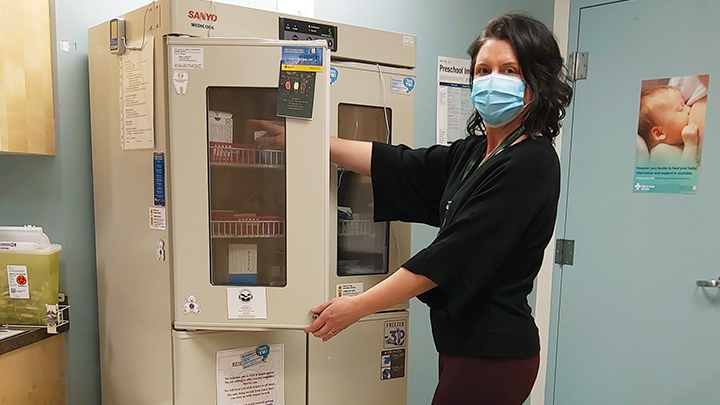
March 29, 2021

Heidi Gould, team lead for Fort McMurray Public Health, is one of several staff members who travel to provide regular public health services to residents of rural and remote Indigenous communities across the Wood Buffalo region. Photo supplied.
Story by Logan Clow
Ensuring residents of rural and remote Indigenous communities in the Wood Buffalo region have regular access to health services is the focus of Alberta Health Services’ (AHS) Fort McMurray Public Health team.
A team of AHS registered nurses — with the support of a licensed practical nurse, registered social worker/mental health therapist and an Indigenous cultural liaison — provide regular outreach services to residents in Fort Chipewyan, Chipewyan Prairie First Nation, Fort McMurray 468 First Nation and Fort McKay.
For continuity of care, public health staff are assigned to specific communities on a regular or rotating basis. All residents are offered core services such as: TB testing and treatment, routine immunizations, support for mothers and their newborns, and COVID-19 swabbing (for residents who book an appointment). This prevention-focused care aims to decrease the need for more urgent healthcare services by their clients.
“I’m proud of this work we’re doing. I think it’s really important as it increases the standard of public health services across the Fort McMurray region,” says Heidi Gould, team lead for Fort McMurray Public Health, which also serves Fort Chipewyan.
“Remote, Indigenous communities deserve the same level of public health services and care that residents in the city of Fort McMurray have access to.”
Since November 2020, Gould and another RN have been flying into Fort Chipewyan to offer public health services three days a week.
Based out of the community’s nursing station, which has its own healthcare team, Gould says their role is to establish a presence within the community, foster positive relationships with clients and residents, and ensure their public health care needs are being met.
“We work with five to 15 clients per day, depending on each client’s care needs. Community members have been openly booking appointments with us, and they’re coming in and bringing their children to see us,” Gould adds. “It feels like a good, positive step in getting public health services into Fort Chipewyan on a regular, consistent basis.”
Fort Chipewyan, located 270 km north of Fort McMurray, is home to about 1,000 residents. Ground transportation from the community to Fort McMurray — the largest and closest urban centre — is only accessible during the winter, due to the many wetlands and river crossings along the route.
Year-round transportation is available by air, an hour’s flight from Fort McMurray.
“Being here on a more regular basis, we’re able to provide timely public health services, and it also streamlines our workflows,” says Gould.
In Chipewyan Prairie First Nation (CPFN), located 120 km south of Fort McMurray, staff provide services Monday to Friday and work out of the community’s health centre.
Paulette Pytak, an RN, has been working in CPFN on rotation for two years.
“We’re always monitoring the health needs of our clients in the community. If needed, we are able to adapt and change our service. Our focus is ensuring clients are getting the care they need,” says Pytak.
“Through our ongoing work in the community, we’ve fostered some really positive relationships. Our goal is to make sure our clients continue to feel safe and comfortable coming to us for the care and services they need.”
Renee Varney, an RN who serves CPFN and Fort McMurray First Nation #468, calls it a team effort. Staff are on hand Tuesdays and Thursdays in Fort McMurray First Nation #468.
“We follow all AHS and COVID-19 protocols, no matter what kinds of services we’re offering, whether it’s immunizations for a young child, or we’re following up with an individual who was bitten by a dog,” says Varney.
“It’s really rewarding work. Every day is different, in that you’re always using multiple public health skill sets. It’s great to see our collective team efforts in these communities as we ensure our clients have access to AHS public health services, no matter where they live in Wood Buffalo.”
Lorraine Albert, an AHS Indigenous cultural liaison, supports the public health team in all of these communities, as well as in Conklin. For example, Albert works alongside Gould in Fort Chipewyan with their prenatal and postnatal program and conducts follow-up home visits with clients. Albert also supports Fort McMurray Public Health’s COVID-19 testing and immunization program.
Albert relies upon her connections and professional relationships to connect public health staff to clients in the community, or with local Elders or leaders who assist with interpreting and translation.
“Dene and Cree are common languages in these communities and English is a second language. There are instances of language barriers and sometimes translations are needed,” adds Albert, who is also Dene.
Having AHS public health staff in these communities is proving beneficial.
“Some residents may not seek services if they’re not familiar with the healthcare provider,” she says. “Having a consistent and regular public health staff member in the community establishes positive and trusting patient-healthcare provider relationships. I’m proud to see the public health work we’re doing here.”
Fort McMurray AHS staff members Stephen Li, Courtney Roache, Cathy Payne, Tammy Couchie and Maddie Amyotte also support the public health team’s work in these communities, along with many others.
For more information about AHS Public Health services available in Fort McMurray, please call 780-791-6247.